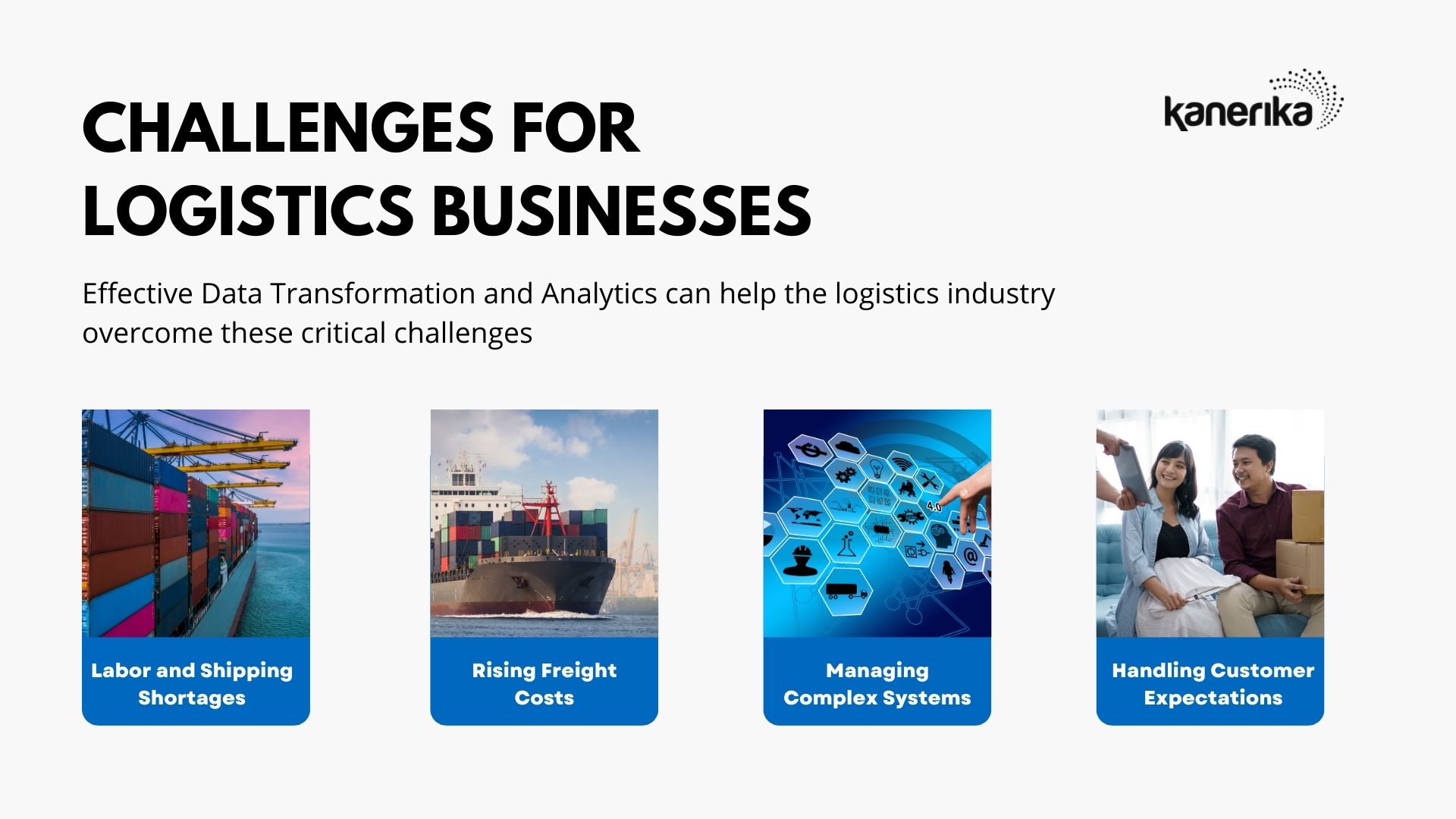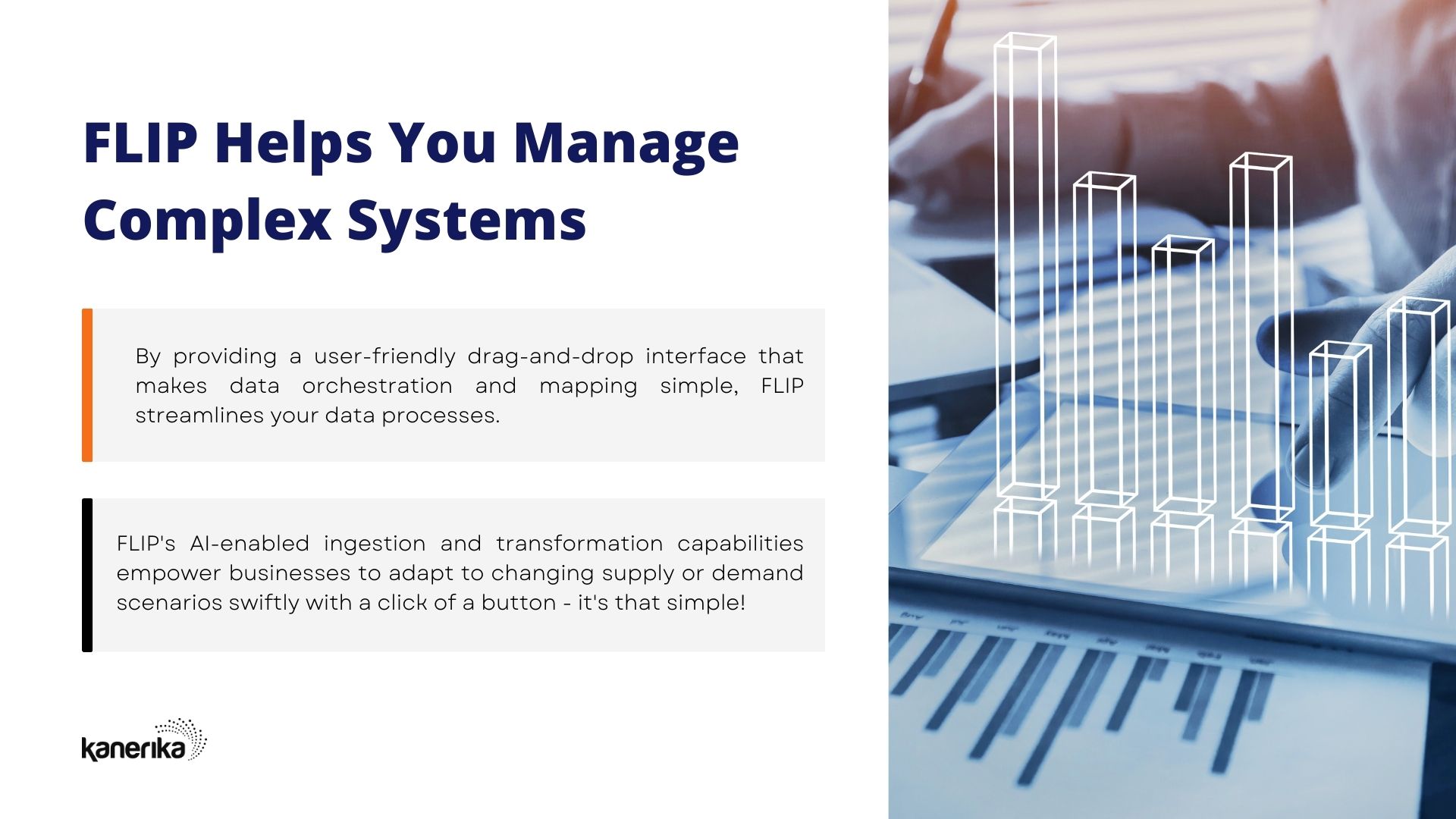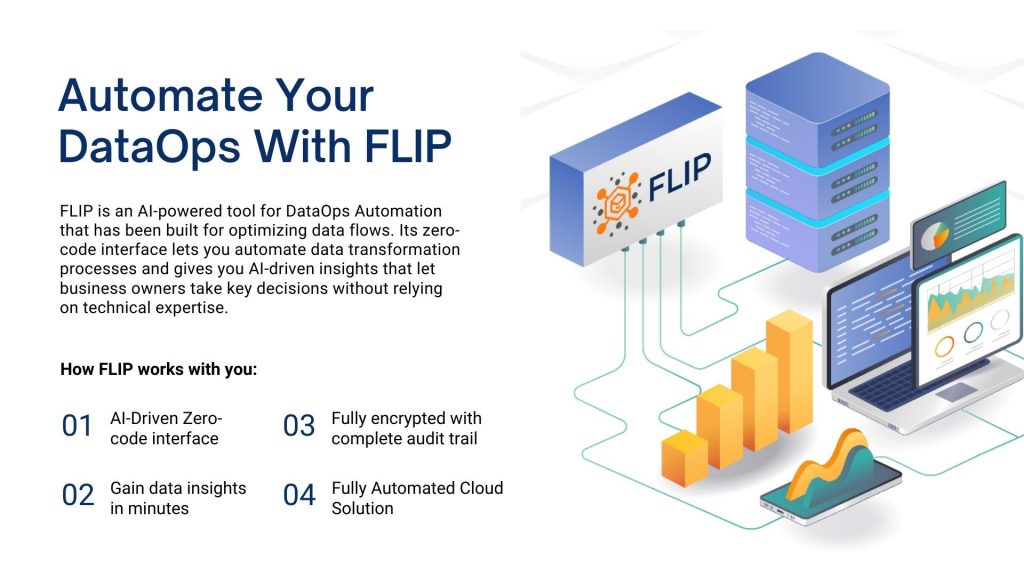In recent times, the logistic challenges including global supply chain disruptions, port congestion, and labor shortages, cloud the logistics industry.
World-changing events such as the 2020 global pandemic or the Russia-Ukraine war have completely uprooted our previously established logistic system. As an industry, logistics faces new challenges in the form of a different reality, one that favours data-backed organizations that can back up their decisions with numbers.
This blog will explore the top logistic challenges businesses are currently dealing with and the creative solutions that FLIP, our AI-powered data transformation platform, provides to solve them.

Labor and Shipping Shortages
The lack of trained professionals and shipping staff is amongst one of the biggest logistic challenges. Health issues and quarantine restrictions brought on by the COVID-19 pandemic have made this problem much worse.
FLIP addresses this challenge by streamlining data operations and reducing manual efforts. Businesses can manage an increased volume of shipments with limited personnel thanks to FLIP’s automation and orchestration capabilities, which optimize operations.
By leveraging FLIP’s proactive alerting and AI-enabled processing, logistics companies can ensure efficient workforce management and minimize delays.
Rising Freight Costs
Freight costs have skyrocketed due to fuel price spikes and shipping container shortages. These rising costs impact the profitability and competitiveness of enterprises.
FLIP offers a solution by optimizing data related to transportation routes and providing accurate insights into freight costs. Businesses can identify cost-saving opportunities, optimize shipping strategies, and mitigate the financial impact of rising freight costs – all by leveraging FLIP’s data transformation functions.
Additionally, with FLIP’s granular data pipeline access and visibility, businesses can make informed decisions to minimize expenses and maintain profitability.
Managing Complex Systems

The logistics sector involves managing multiple teams, services, and networks, often spanning different time zones. For companies looking to streamline their logistical operations, this complexity presents a hurdle.
By providing a user-friendly drag-and-drop interface that makes data orchestration and mapping simple, FLIP streamlines this procedure. Its pre-built industry templates offer a head start for businesses in managing logistics-specific processes, such as inventory tracking and supply chain transparency.
FLIP’s AI-enabled ingestion and transformation capabilities empower businesses to adapt to changing supply or demand scenarios swiftly, improving overall efficiency.
Handling Customer Expectations
Online shopping has increased customer expectations for speed, convenience, and transparency in logistics operations.
FLIP enables businesses to meet these expectations by ensuring accurate and real-time data visibility related to product shipments. With FLIP’s proactive alerting and data lineage visibility features, businesses can anticipate and address potential delays or issues, keeping customers informed and satisfied.
By leveraging FLIP’s pre-built RPA connectors and OCR capability, businesses can efficiently handle unstructured, structured, and real-time streaming data, enhancing the overall customer experience.
FLIP Helps Manage Logistic Challenges & More!
The logistics industry is an essential cog in the functioning of global businesses, which often also makes it the most vulnerable to tectonic shifts in consumer trends, global pandemics and other logistic challenges.
Keeping these factors in mind, we have designed FLIP as a comprehensive solution to overcome these obstacles. Its AI-powered DataOps platform empowers businesses to optimize logistics processes, mitigate risks, and improve efficiency. Our platform employs zero-code automation protocols with extensive data transformation capabilities and proactive alerting features to support businesses of all sizes and locations.
Navigate industry obstacles and emerge as an efficient and competitive market participant by adopting FLIP into your logistical operations.
Explore FLIP’s game-changing powers today!
FAQ
How can businesses benefit from FLIP's industry templates in managing logistics-specific processes?
Businesses can benefit from FLIP's industry templates by gaining a head start in managing logistics-specific processes, such as inventory tracking and supply chain transparency. These templates provide a structured framework for optimizing logistics operations.
Can FLIP assist businesses in adapting to changing supply or demand scenarios in the logistics sector?
Yes, FLIP's AI-enabled ingestion and transformation capabilities empower businesses to adapt swiftly to changing supply or demand scenarios, improving overall logistics efficiency and ensuring responsiveness to market fluctuations.
How does FLIP help businesses meet and exceed customer expectations in logistics operations?
FLIP ensures accurate and real-time data visibility related to product shipments. It provides proactive alerting and data lineage visibility features, allowing businesses to anticipate and address potential delays or issues, ultimately keeping customers informed and satisfied.
How does FLIP simplify the management of complex logistics systems for businesses?
FLIP offers a user-friendly drag-and-drop interface and pre-built industry templates for logistics-specific processes. It empowers businesses to manage multiple teams, services, and networks efficiently, improving overall logistics efficiency.
Can FLIP assist businesses in adapting to changing supply or demand scenarios in logistics?
Yes, FLIP's AI-enabled ingestion and transformation capabilities enable businesses to adapt swiftly to changing supply or demand scenarios, enhancing logistics efficiency and responsiveness.
How does FLIP address the challenge of labor and shipping shortages in logistics?
FLIP streamlines data operations and reduces manual efforts, enabling businesses to handle increased shipment volumes with limited personnel. Its automation and orchestration capabilities optimize operations, and proactive alerting and AI-enabled processing ensure efficient workforce management and minimal delays.
How can businesses benefit from FLIP's granular data pipeline access and visibility in logistics operations?
FLIP's granular data pipeline access and visibility enable businesses to make informed decisions, optimize logistics operations, minimize expenses, and maintain profitability by providing insights into their data and processes.
What are some key benefits of leveraging FLIP's automation and orchestration capabilities in logistics?
Leveraging FLIP's automation and orchestration capabilities streamlines data operations, reduces manual efforts, and optimizes logistics operations. This enables businesses to efficiently manage increased shipment volumes, even with limited personnel.
Thank you for reading our new series of posts on FLIP. If you want to know more about Kanerika and FLIP, please write to us at [email protected].
Follow us on LinkedIn and Twitter for insightful industry news, business updates and all the latest data trends online.